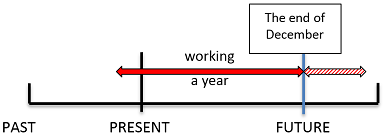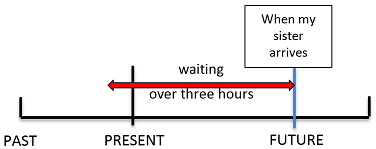Future perfect continuous
Introduction
We use the future perfect continuous to describe a continuous action that is already in progress at a point in the future.
We often use it with "for" to state the amount of time between when the action started and a point in its progress in the future or the point when we expect the action to finish.
We can also use it to describe a continuous action that we believe or predict is currently in progress.
Examples
- "At the end of December, James will have been working at the company for a year."

- "By the time my sister arrives at the airport, I will have been waiting for over three hours."

- "Sarah won't have been reading her emails because she’s on holiday."

Form
We form the future perfect continuous with "will have been" + "-ing" form of the main verb.| Positive |
I
You We They He / She / It |
will have been | waiting | for 3 hours. |
| Negative |
won't have been
will not have been |
| question | Will |
I
you we they he / she / it |
have been | waiting | for 3 hours? |
We often use the future perfect continuous with future events or times and with expressions that refer to the future like "when" or "by the time (something happens)" and "for how long".
Examples
- "I will have been reading this book for months by the time I finally finish it."
- "She won’t have been expecting you to arrive so early."
- "When you finish your exams, for how long will you have been studying English?"
Practice
.Further practice
Complete the sentences to form the future perfect continuous with the correct answer from a, b, c or d:.
Create a free Getting Started account
Related links
The following exercises include use of this grammar structure:
You might also be interested in:
- Business English vocabulary exercises
- Scenario-based dictation exercises – business English Pro account
You might also be interested in:
Beginner
- Past simple
- Past continuous
- Present simple
- Present continuous (present)
- Present perfect
- 'Going to' and 'will'
- Present continuous (future)
- Imperatives
- To be
- Pronouns: subject, object
- Pronouns: relative
- Adjectives and pronouns: possessive
- Adjectives and pronouns: demonstrative
- Basic adjective word order
- WH questions (interrogative pronouns)
- Articles: a, an, the
- Prepositions: time and place
- There is/ there are and quantifiers
- Conjunctions and, or, but
- Comparatives / superlatives (than)
- Zero conditional (if)
- First conditional (if)
- Modals: can/can't, could, will, shall
- Verb patterns
- Sequence adverbs
Intermediate
- Past perfect
- Past simple vs. present perfect
- Past simple vs. past continuous
- Present perfect continuous
- Future simple
- Future continuous
- Passive
- Indirect speech
- Used to/would
- Second conditional
- Third conditional
- Relative clauses
- Reflexive pronouns
- Modals: must, have to, should, should have
- Verb patterns: gerund or infinitive
- Adverbs of degree
- Adjective order
- Adjectives: ed or ing
Grammar
Quickly identify and focus on grammar issues:
- Grammar worksheets and test
- Scenario-based grammar exercises
- Grammar additional practice questions
- Verb conjugation practice
- Conditionals practice
Improve your grammar
Vocabulary
Vocabulary exercises:Expand your vocabulary using our three vocabulary trainers:Practice your spelling using our three spelling tests:Practice vocabulary relating to graphs and charts:
Learn vocabulary
Dictation exercises
Practice your listening skills and spelling using our dictation exercises:
- Scenario-based dictation exercises - general English
- Scenario-based dictation exercises - business English
- Dictation: focus on grammar
- Numbers
Complete dictation exercises
Video lessons
Focus on specific areas of business English using our video lessons:
Take a video lesson





